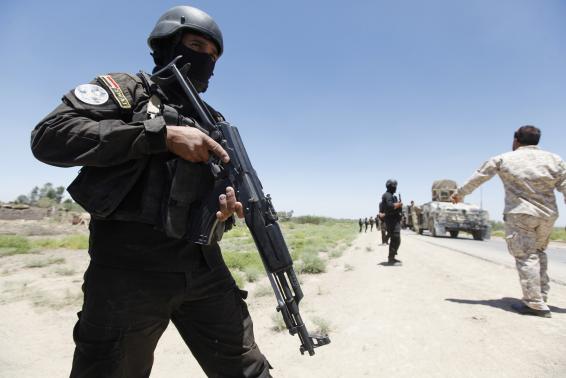
CREDIT: REUTERS/AHMED SAAD
(Reuters) – Militants took a town an hour from Baghdad that is home to four natural gas fields on Thursday, another gain by Sunni insurgents who have swiftly taken large areas to the north and west of the Iraqi capital.
Iraq’s presidency said a session of parliament would be held on July 1, the first step to forming a new government that the international community hopes will be inclusive enough to undermine the insurgency.
The overnight offensive included Mansouriyat al-Jabal, home to the gas fields where foreign companies operate, security forces said. The fighting threatens to rupture the country two and a half years after the end of U.S. occupation.
The insurgents, led by the hardline Islamic State in Iraq and the Levant (ISIL) but also including other Sunni groups blame Prime Minister Nuri al-Maliki for marginalizing their sect during eight years in power and he is fighting for his job.
Three months after elections, a chorus of Iraqi and international voices have called for the government formation process to be started, including Iraqi’s most influential Shi’ite Grand Ayatollah Ali al-Sistani.
The presidency issued a decree on Thursday for a parliament session on July 1, state television said. Parliament will then have 30 days to name a president and 15 days after that to name a prime minister although the process has been delayed in the past, taking nine months to seat the government in 2010.
Maliki has dismissed the call of mainly Sunni political and religious figures, some with links to armed groups fighting Maliki, for a “national salvation government” that would choose figures to lead the country and, in effect, bypass the election.
Iraq’s Shi’ite religious cleric Moqtada al-Sadr, a foe of Maliki’s, called for all Iraqis to deplore the Sunni insurgency and rally behind the army but said that a new government was needed “with faces from all spectrums and away from sectarian quotas.”
Head of the Mehdi Army, a Shi’ite militia which fought U.S. troops in Baghdad, Sadr vowed in a speech on Wednesday night to “shake the ground under the feet of ignorance and radicalism just as we did under the feet of the occupier.”
Northern Iraq’s largest city Mosul fell to Sunni insurgents on June 10 and took Tikrit city two days later. Kurdish forces moved into Kirkuk on June 11 and now control the oil city.
Army air strikes hit south Mosul overnight, killing one and wounding six people.
INCLUSIVE
Disparate Sunni fighters want to form an Islamic Caliphate from the Mediterranean Sea toIran. They now control a border post with Syria and have stolen U.S.-made weapons from Iraqi forces.
U.S. Secretary of State John Kerry pressed Iraqi officials to form an “inclusive” government during a visit this week and urged leaders of the autonomous Kurdish region to stand with Baghdad against the onslaught.
Maliki’s Shi’ite-led State of Law coalition won the most seats in the April elections but needs support of other Shi’ite groups, Sunnis and Kurds to build a government.
The United Nations says more than 1,000 people, mainly civilians, have been killed during the Sunni insurgents’ advance in Iraq.
The figure includes unarmed government troops machine gunned in mass graves by insurgents, as well as several reported incidents of prisoners killed in their cells by retreating government forces.
In addition to the bloodshed, close to a million people have been displaced in Iraq this year. Amin Awad, director of Middle East and North Africa bureau for the U.N. refugee agency, called Iraq on Wednesday “a land of displacement”.
U.S. President Barack Obama has ruled out sending ground troops back to Iraq where they withdrew in 2011. He has offered up to 300 American military advisers, about 130 of whom have now been deployed.







